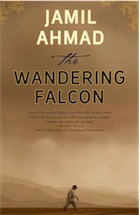 I've been wringing my hands, racking my brain, and ransacking my books since Sister Mary Murderous posted her list of favorite 2011 reads. I'm not the organized person she is, and trying to figure out which the heck books I read in 2011, let alone which were my favorites, is a Sisyphean chore. These questions will require more mental and physical excavations over the next few weeks, but not completing this task is inconceivable. The guilt I'm already feeling at my lateness allowed me to eat pumpkin pie for breakfast this morning while my brain smoldered. Compiling my best-of-2011 list is a tough job, but others in fiction had tougher lives than I do. Let me point out a few of them in these books I read in 2011.
I've been wringing my hands, racking my brain, and ransacking my books since Sister Mary Murderous posted her list of favorite 2011 reads. I'm not the organized person she is, and trying to figure out which the heck books I read in 2011, let alone which were my favorites, is a Sisyphean chore. These questions will require more mental and physical excavations over the next few weeks, but not completing this task is inconceivable. The guilt I'm already feeling at my lateness allowed me to eat pumpkin pie for breakfast this morning while my brain smoldered. Compiling my best-of-2011 list is a tough job, but others in fiction had tougher lives than I do. Let me point out a few of them in these books I read in 2011.Oh Lordy. An incredibly brutal world, religious passion, and bizarre characters. Themes of destruction, creation, and redemption. Last year I read about Francis Tarwater, a 14-year-old boy who struggles with his destiny as a prophet in Flannery O'Connor's ironic southern gothic The Violent Bear It Away. Last night I read Donald Ray Pollock's The Devil All the Time, a 2011 book its publisher states "marr[ies] the twisted intensity of Oliver Stone's Natural Born Killers with the religious and gothic overtones of Flannery O'Connor at her most haunting." Doubleday got that right. The Devil All the Time has a three-story plotline involving Arvis Eugene Russell, an orphaned 9-year-old boy, whose beautiful mother Charlotte dies of cancer despite her husband Willard's blood sacrifices on his prayer log in the woods; a traveling preacher named Roy and his wheelchair-bound friend Theodore; and a young married couple who use their summer vacations to pick up and kill hitchhikers. This account takes place from the end of World War II to the mid-1960s in the hardscrabble world of Knockemstiff, a town in rural southern Ohio, and West Virginia. Lovers of noir should read no more about this powerful book; they should just read it.
The fictional world of Daniel Woodrell contains less religious fervor than Pollock's but no less brutality. His three hardboiled novels have been collected into the 2011 omnibus The Bayou Trilogy. These bold and gritty tales are set in St. Bruno, in Louisiana's bayou country north of New Orleans. They feature Cajun ex-prizefighter-turned-cop Rene Shade, who lives above his mother's pool hall and maintains complicated relationships with his two brothers, bar-owner Tip and prosecutor Francois. The first novel in the Trilogy, Under the Bright Lights, concerns the killing of a black member of the city council. Despite the mayor's desire that the police investigation calls it a robbery, Shade's digging leads to a festering mess of corruption and betrayal. In Muscle for the Wing, some ex-cons try to take over St. Bruno's gambling scene, and Rene becomes involved. The Ones You Do finds Shade's long-gone father, pro gambler John X., returning to St. Bruno.
Woodrell grew up on the Mississippi River and currently lives in the Ozarks. He is a masterful storyteller and his characters––desperate losers anxious to escape their fates and more sophisticated bad guys who prey on them––are unforgettable. Woodrell is author of four standalone novels, including the wonderful Winter's Bone (16-year-old Ree Dolly has one week to find her meth-cooking, bail-jumping father before losing the family home), which was made into the 2010 movie of the same name.
Half the world away, life is not easy for characters in Jamil Ahmad's The Wandering Falcon. The Wandering Falcon of the title is born near the book's beginning, and the reader catches glimpses of him as he moves from childhood to adulthood. The chapters are like pop beads strung together––neither completely independent stories nor a flowing narrative from one chapter to the next. This memorable nonmystery fiction features lyrical writing by an 80-year-old man who well knows the people and region of plains and mountains in Afghanistan and Pakistan, where tribesmen have moved their families and animals according to the season for centuries. Now, governmental regulations and pressures of modernity are changing their lives. The slim 2011 book is a glimpse at an area of the world that's in the news but still mysterious to many of us. After reading it, I have a better understanding, and I highly recommend it.





No comments:
Post a Comment